形容词比较级和最高级
常用形容词的比较级和最高级
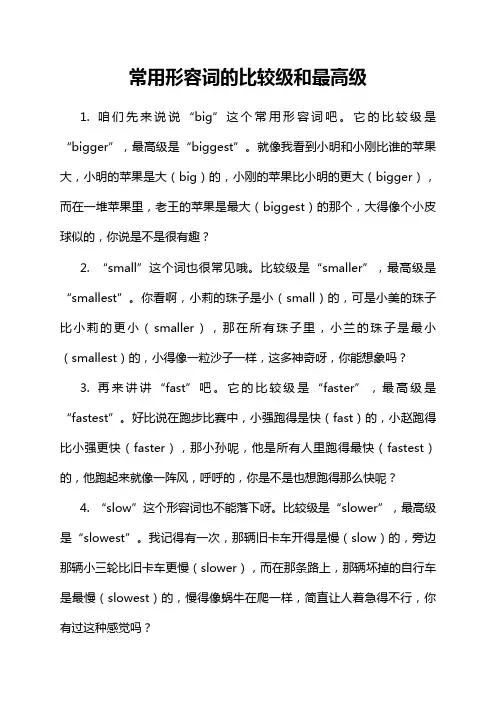
6. “short”也得好好唠唠。比较级是“shorter”,最高级是“shortest”。比如说小伟是矮(short)的,小邓比小伟更矮(shorter),在一群小朋友里,小韩是最矮(shortest)的,矮得像个小蘑菇,哈哈,是不是很可爱的形容呢?
2. “small”这个词也很常见哦。比较级是“smaller”,最高级是“smallest”。你看啊,小莉的珠子是小(small)的,可是小美的珠子比小莉的更小(smaller),那在所有珠子里,小兰的珠子是最小(smallest)的,小得像一粒沙子一样,这多神奇呀,你能想象吗?
3. 再来讲讲“fast”吧。它的比较级是“faster”,最高级是“fastest”。好比说在跑步比赛中,小强跑得是快(fast)的,小赵跑得比小强更快(faster),那小孙呢,他是所有人里跑得最快(fastest)的,他跑起来就像一阵风,呼呼的,你是不是也想跑得那么快呢?
9. “narrow”这个形容词也很常用呢。比较级是“narrower”,最高级是“narrowest”。就像这条小路是窄(narrow)的,那条小巷子比这条小路更窄(narrower),而山间的那条羊肠小道是最窄(narrowest)的,窄得只能一个人侧身通过,走在上面都有点害怕呢,你有走过这么窄的路吗?
我的观点结论就是:常用形容词的比较级和最高级在我们日常生活中的描述中非常有用,它们可以让我们把事物之间的差别更生动形象地表达出来,就像给我们的表达增添了魔法一样。
形容词的比较级与最高级
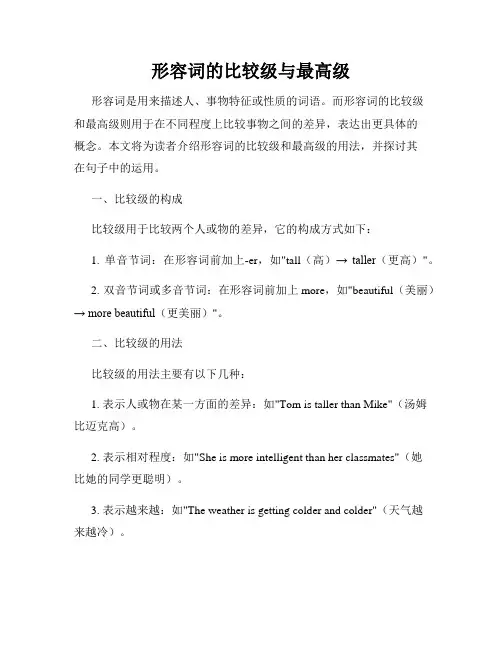
形容词的比较级与最高级形容词是用来描述人、事物特征或性质的词语。
而形容词的比较级和最高级则用于在不同程度上比较事物之间的差异,表达出更具体的概念。
本文将为读者介绍形容词的比较级和最高级的用法,并探讨其在句子中的运用。
一、比较级的构成比较级用于比较两个人或物的差异,它的构成方式如下:1. 单音节词:在形容词前加上-er,如"tall(高)→ taller(更高)"。
2. 双音节词或多音节词:在形容词前加上more,如"beautiful(美丽)→ more beautiful(更美丽)"。
二、比较级的用法比较级的用法主要有以下几种:1. 表示人或物在某一方面的差异:如"Tom is taller than Mike"(汤姆比迈克高)。
2. 表示相对程度:如"She is more intelligent than her classmates"(她比她的同学更聪明)。
3. 表示越来越:如"The weather is getting colder and colder"(天气越来越冷)。
4. 与than连用,表示一个被比较的对象:如"I have more friends than you"(我有比你更多的朋友)。
三、最高级的构成最高级用于比较三个或三个以上的人或物,它的构成方式如下:1. 单音节词在形容词前加上-est,如"tall(高)→ tallest(最高)"。
2. 双音节词或多音节词在形容词前加上most,如"beautiful(美丽)→ most beautiful(最美丽)"。
四、最高级的用法最高级的用法主要有以下几种:1. 表示最高程度:如"He is the tallest boy in our class"(他是我们班最高的男生)。
形容词的比较级和最高级大全
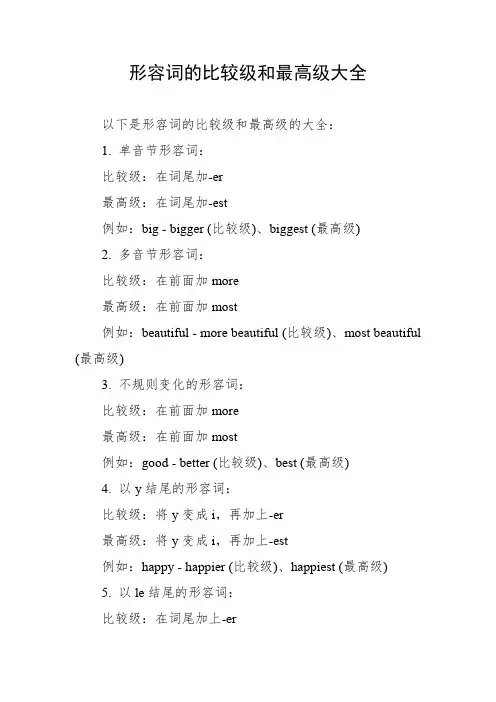
形容词的比较级和最高级大全以下是形容词的比较级和最高级的大全:1. 单音节形容词:比较级:在词尾加-er最高级:在词尾加-est例如:big - bigger (比较级)、biggest (最高级)2. 多音节形容词:比较级:在前面加more最高级:在前面加most例如:beautiful - more beautiful (比较级)、most beautiful (最高级)3. 不规则变化的形容词:比较级:在前面加more最高级:在前面加most例如:good - better (比较级)、best (最高级)4. 以y结尾的形容词:比较级:将y变成i,再加上-er最高级:将y变成i,再加上-est例如:happy - happier (比较级)、happiest (最高级)5. 以le结尾的形容词:比较级:在词尾加上-er最高级:在词尾加上-est例如:possible - more possible (比较级)、most possible (最高级)6. 少数不规则变化的形容词:比较级:在前面加more最高级:在前面加most例如:famous - more famous (比较级)、most famous (最高级)7. 特殊的比较级和最高级:例如:well - better (比较级)、best (最高级)8. 副词的比较级和最高级:比较级:在后面加-er最高级:在后面加-est例如:slowly - more slowly (比较级)、most slowly (最高级)以上是常见的形容词的比较级和最高级,但是也有一些不规则变化的形容词需要记忆。
同时,需要注意的是,有些形容词没有比较级和最高级,如unique。
形容词的比较级和最高级
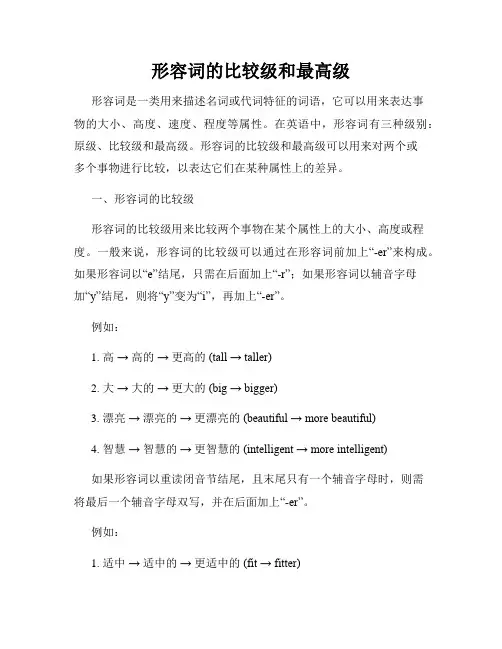
形容词的比较级和最高级形容词是一类用来描述名词或代词特征的词语,它可以用来表达事物的大小、高度、速度、程度等属性。
在英语中,形容词有三种级别:原级、比较级和最高级。
形容词的比较级和最高级可以用来对两个或多个事物进行比较,以表达它们在某种属性上的差异。
一、形容词的比较级形容词的比较级用来比较两个事物在某个属性上的大小、高度或程度。
一般来说,形容词的比较级可以通过在形容词前加上“-er”来构成。
如果形容词以“e”结尾,只需在后面加上“-r”;如果形容词以辅音字母加“y”结尾,则将“y”变为“i”,再加上“-er”。
例如:1. 高→ 高的→ 更高的(tall → taller)2. 大→ 大的→ 更大的(big → bigger)3. 漂亮→ 漂亮的→ 更漂亮的(beautiful → more beautiful)4. 智慧→ 智慧的→ 更智慧的(intelligent → more intelligent)如果形容词以重读闭音节结尾,且末尾只有一个辅音字母时,则需将最后一个辅音字母双写,并在后面加上“-er”。
例如:1. 适中→ 适中的→ 更适中的(fit → fitter)需要注意的是,有一些形容词的比较级是不规则的,需要单独记忆。
下面是一些常见的不规则比较级形式:1. 好→ 好的→ 更好的(good → better)2. 小→ 小的→ 更小的 (l ittle → less)3. 多→ 多的→ 更多的(many → more)4. 远→ 远的→ 更远的(far → farther/further)形容词的比较级在句子中一般用于比较两个事物之间的差异。
比较级可以与"than"搭配使用,构成比较结构。
例如:1. 这本书比那本书更有趣。
(This book is more interesting than that book.)2. 这座建筑物比那座建筑物高得多。
(This building is much tallerthan that building.)二、形容词的最高级形容词的最高级用来表达一组事物中某个属性的极限。
形容词的比较级与最高级详细讲解
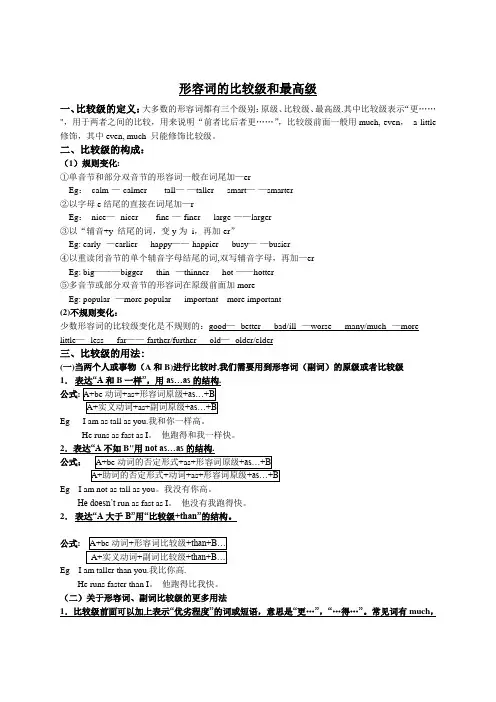
形容词的比较级和最高级一、比较级的定义:大多数的形容词都有三个级别:原级、比较级、最高级.其中比较级表示“更……",用于两者之间的比较,用来说明“前者比后者更……”,比较级前面一般用much, even,a little 修饰,其中even, much 只能修饰比较级。
二、比较级的构成:(1)规则变化:①单音节和部分双音节的形容词一般在词尾加—erEg:calm-—-calmer tall—-—taller smart—-—smarter②以字母e结尾的直接在词尾加—rEg:nice—--nicer fine-—-finer large-——larger③以“辅音+y 结尾的词,变y为i,再加-er”Eg: early--—earlier happy——-happier busy—-—busier④以重读闭音节的单个辅音字母结尾的词,双写辅音字母,再加—erEg: big———bigger thin--—thinner hot-——hotter⑤多音节或部分双音节的形容词在原级前面加moreEg: popular--—more popular important---more important(2)不规则变化:少数形容词的比较级变化是不规则的:good—--better bad/ill--—worse many/much--—more little—--less far——-farther/further old—--older/elder三、比较级的用法:(一)当两个人或事物(A和B)进行比较时,我们需要用到形容词(副词)的原级或者比较级1.表达“A和B一样”,用as…as的结构.公式Eg I am as tall as you.我和你一样高。
He runs as fast as I。
他跑得和我一样快。
Eg I am not as tall as you。
我没有你高。
He doesn’t run as fast as I。
什么是形容词的比较级和最高级
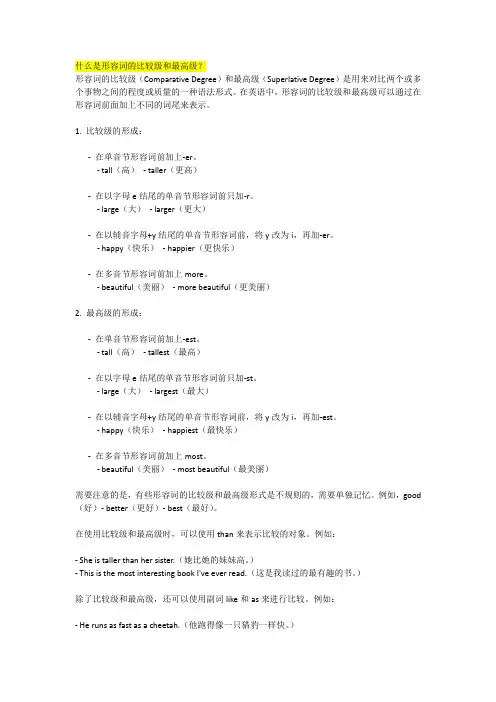
什么是形容词的比较级和最高级?形容词的比较级(Comparative Degree)和最高级(Superlative Degree)是用来对比两个或多个事物之间的程度或质量的一种语法形式。
在英语中,形容词的比较级和最高级可以通过在形容词前面加上不同的词尾来表示。
1. 比较级的形成:-在单音节形容词前加上-er。
- tall(高)- taller(更高)-在以字母e结尾的单音节形容词前只加-r。
- large(大)- larger(更大)-在以辅音字母+y结尾的单音节形容词前,将y改为i,再加-er。
- happy(快乐)- happier(更快乐)-在多音节形容词前加上more。
- beautiful(美丽)- more beautiful(更美丽)2. 最高级的形成:-在单音节形容词前加上-est。
- tall(高)- tallest(最高)-在以字母e结尾的单音节形容词前只加-st。
- large(大)- largest(最大)-在以辅音字母+y结尾的单音节形容词前,将y改为i,再加-est。
- happy(快乐)- happiest(最快乐)-在多音节形容词前加上most。
- beautiful(美丽)- most beautiful(最美丽)需要注意的是,有些形容词的比较级和最高级形式是不规则的,需要单独记忆。
例如,good (好)- better(更好)- best(最好)。
在使用比较级和最高级时,可以使用than来表示比较的对象。
例如:- She is taller than her sister.(她比她的妹妹高。
)- This is the most interesting book I've ever read.(这是我读过的最有趣的书。
)除了比较级和最高级,还可以使用副词like和as来进行比较。
例如:- He runs as fast as a cheetah.(他跑得像一只猎豹一样快。
形容词比较级和最高级
形容词比较级和最高级形容词比较级和最高级用于比较两个或更多事物的特征或性质。
以下是形容词比较级和最高级的形式和用法:比较级的形式:1. 一般形容词的比较级在词尾加上-er,例如:taller(更高的)、faster(更快的)。
2. 以字母e结尾的形容词,在词尾加上-r,例如:nicer(更好的)。
3. 以辅音字母+元音+辅音字母结尾的单音节形容词,双写最后一个辅音字母,再加上-er,例如:bigger(更大的)。
4. 以重读闭音节结尾的双音节及多音节形容词,在词尾加上-er,例如:happier(更快乐的)。
最高级的形式:1. 一般形容词的最高级在词尾加上-est,例如:tallest(最高的)、fastest(最快的)。
2. 以字母e结尾的形容词,在词尾加上-st,例如:nicest(最好的)。
3. 以辅音字母+元音+辅音字母结尾的单音节形容词,双写最后一个辅音字母,再加上-est,例如:biggest(最大的)。
4. 以重读闭音节结尾的双音节及多音节形容词,在词尾加上-est,例如:happiest(最快乐的)。
注意事项:1. 有些形容词的比较级和最高级形式是不规则的,例如:good (better,best)、bad(worse,worst)。
2. 当形容词以-y结尾时,变为-i加-er或-i加-est,例如:funny (funnier,funniest)。
3. 对于很多双音节或多音节的形容词,可以在前面加上more (比较级)或most(最高级)来构建比较级或最高级形式,例如:beautiful(more beautiful,most beautiful)。
使用比较级和最高级时,常用的表达方式有:1. 比较级+than(比……更……):He is taller than his brother.(他比他兄弟更高。
)2. the+最高级+of(最……的……):She is the smartest student in the class.(她是班里最聪明的学生。
形容词比较级和最高级
(2).以辅字母+y结尾的,变y为i,再加-er或-est:easy—easier—easiest happy—happier—h appiest(3).以“辅元辅”结尾的,双写末尾字母,再加-er或-est: big—bigger—biggest常见的还有:thin, fat, wet, red,sadhot—hotter—hottest(4).不规则变化:good—better—bestmany/much—more—most(好坏多少远老)bad—worse—worstlittle(少)—less—leastfar—farther/further—fa rthest/furthestold—older/elder—oldest/eldest(5).其他较短的单词,直接在词尾加-er或-est。
small—smaller short—shorter(6).对于较长的单词,在其前加more,most即可。
popular—more popular—the most populardelicious—more delicious—the most delicious[中考题]1. This T-shirt is not large enough. Please show me a _______one.A.large B. larger C. largest2. She is the ____________ (good) student in her class.注意:以下词为易错,few—fewer new—newer—newest clever—cleverer tired—moretired pleased—more pleased常考知识点二:含有比较级的句型结构1) A is ...than B: A比B更....The earth is biggerthan the moon.2) A do sth ...than B: A比B更....He works harder thanus.[中考题]China has become much__________(strong)than before. We are proud of her.3)Which/ Who is ...., A or B? “A和B哪个/谁更...?”—Because it is ________ winter in Guangzhou.A. as cold asB. much colder thanC. not so coldas D. not colder than3、—What should we do now, Mr. Clark?(2013年黄冈,35)—Please turn to Page _____and look at the _____ picture.A. Twelve; fifthB. Twelfth; fifthC. Twelve; fiveD. Twelfth; five4、—How was your weekend?(2012年,29)—Great! It was my grandfather’s ______ birthday. We enjoyed ourselves.A. seventyB.seventieth C. the seventieth D. seventeenth5、Three students ran faster than Lily in the race. Lily was ________.(2012年,34)A. the fourthB.four C. the third D. three6、—Is Beijing a city with a long history? (2012年,23)— Of course. And after the Olympic Games, __ people came to Beijing for a visit during the vacation.A. thousands ofB. thousandC. five thousandsD. five thousand of二、用所给词的适当形式填空。
形容词的比较级和最高级
形容词的比较级和最高级形容词是我们用来描绘事物特性、表达情感色彩的重要词汇。
而形容词的比较级和最高级则可以用来对两个或多个事物进行比较,并突出它们在某个特性上的差异。
在英语中,形容词的比较级和最高级有规律的构造方式,下面将详细介绍。
一、形容词的比较级比较级通常用来比较两个人或物在某个特性上的程度差异。
一般情况下,在形容词后面加上"-er"可以构成形容词的比较级。
例如:1. The dog is bigger than the cat.(狗比猫大。
)2. She is taller than her sister.(她比她妹妹高。
)3. This book is more interesting than the previous one.(这本书比之前的那本更有趣。
)需要注意的是,有些形容词的比较级是不规则的,需要记忆。
例如:1. good - better(好 - 更好)2. bad - worse(坏 - 更坏)3. far - farther/further(远 - 更远)二、形容词的最高级最高级用来描述一个人或物在某个特性上超过其他所有人或物的程度。
一般情况下,在形容词前面加上"the",再加上"-est"可以构成形容词的最高级。
例如:1. He is the tallest student in the class.(他是班里最高的学生。
)2. This is the most interesting movie I have ever watched.(这是我看过的最有趣的电影。
)3. It is the best book I have read.(这是我读过的最好的书。
)同样需要记忆的是,有些形容词的最高级也是不规则的。
例如:1. good - best(好 - 最好)2. bad - worst(坏 - 最坏)3. far - farthest/furthest(远 - 最远)三、比较级和最高级的使用方式除了直接用于比较两个人或物的特性差异外,比较级和最高级也可以与"than"、"of"等词搭配使用。
形容词比较级和最高级
]形容词比较级和最高级绝大多数形容词有三种形式,原级,比较级和最高级, 以表示形容词说明的性质在程度上的不同。
形容词的原级: 形容词的原级形式就是词典中出现的形容词的原形。
形容词的比较级和最高级: 形容词的比较级和最高级形式是在形容词的原级形式的基础上变化的。
分为规则变化和不规则变化。
规则变化如下:1) 单音节形容词(一个元音)的比较级和最高级形式是在词尾加 -er 和 -est 构成。
great (原级) (比较级) (最高级)2) 以 -e 结尾的单音节形容词的比较级和最高级是在词尾加 -r 和 -st 构成。
wide (原级) (比较级) (最高级)3)少数以-y, -er, -ow, -ble结尾的双音节形容词的比较级和最高级是在词尾加-er 和-est 构成。
clever(原级) (比较级) (最高级)4) 以 -y 结尾,但 -y 前是辅音字母的形容词的比较级和最高级是把 -y 去掉,加上 -ier 和-est 构成.happy (原形) (比较级) (最高级)5) 以一个辅音字母结尾其前面的元音字母发短元音的形容词的比较级和最高级是双写该辅音字母然后再加-er和-est。
big (原级) (比较级) (最高级)6) 双音节和多音节形容词的比较级和最高级需用more 和 most 加在形容词前面来构成。
beautiful (原级) (比较级) (比较级)difficult (原级) (最高级) (最高级)常用的不规则变化的形容词的比较级和最高级:原级------比较级------最高级good------better------bestmany------more------mostmuch------more------mostbad------worse------worstfar------farther, further------farthest, furthest形容词比较级的用法:形容词的比较级用于两个人或事物的比较,其结构形式如下:主语+谓语(系动词)+ 形容词比较级+than+ 对比成分。
- 1、下载文档前请自行甄别文档内容的完整性,平台不提供额外的编辑、内容补充、找答案等附加服务。
- 2、"仅部分预览"的文档,不可在线预览部分如存在完整性等问题,可反馈申请退款(可完整预览的文档不适用该条件!)。
- 3、如文档侵犯您的权益,请联系客服反馈,我们会尽快为您处理(人工客服工作时间:9:00-18:30)。
初二语法讲义
1 构成方法:1)辅音+y的改y为i加er/est 2)大小胖瘦湿热悲红适合===双写最后一个字母
3)多音节词或以ing, ed, ful, less, ly, ous结尾的加more,most构成
good – better – best ill/bad/badly – worse – worst many/much – more – most
little – less – least far – farther – farthest(距离)/further - furthest(水准+距离)
old-older-oldest(年龄)/elder-eldest(哥哥姐姐)
2 注意点:1)两者之间用比较级,三者以上用最高级。
2)than+比较级,among, of, in+最高级,为免重复,常用one(s), that,those等词来替代前词。
3)A or B用比较级,A,B or C用最高级
4)much, even, still, far, a little, a bit, a lot +比较级
5)very, so, such, quite, too +原级,more,most +原级构成比较级和最高级
6)比较级and 比较级====越来越taller and taller more and more important
7) the+比较级,the+比较级==越--就越-- The harder you work, the better you’ll be.
8) the +比较级+of the two,形容词最高级前+the,也可用形容词性物主代词(my best friend),副词最高级前可不+the,也可序数词+最高级,the second largest
9)比较级+than any other +单数名词=比较级+than the other +复数名词=最高级+范围10)one of +the +最高级+复数名词
11)可数名词前用few, a few, fewer, fewest, 不可数名词前用little, a little, less, least
12) 形容词一般+ly构成副词,y结尾改为i+ly,e结尾直接+ly(除true—truly),le改ly
Terrible-terribly, healthy-healthily, polite-politely
13) 有些词既是adj又是adv,如:far, fast, hard, long, late, high, straight等, 但friendly, lovely, lonely, daily, weekly, monthly, yearly, deadly却是形容词
14)as+adj/adv原级+as,not as/so---as 不如(注意应是同类事物比较,以及如何和比较级最高级转换)as---as possible 尽可能---
反身代词固定词组(反身代词不可单独作主语,复数改f为ves)
dress oneself 自己穿衣enjoy oneself 过的快活help oneself to 随便吃、随便用say to oneself 心里想say to oneself 自言自语teach oneself 自学=learn—by oneself
for oneself 为自己;亲自地by oneself 独自地; hurt oneself受伤; pull oneself up the rocks攀岩look after oneself照顾自己keep the secret to oneself保密
祈使句
1)肯定祈使句V原开头,回答(I will)否定祈使句Don’t/Never+V原(回答sorry, I won’t)2)人名,+祈使句let’s do/ let’s not do
3)祈使句,and/or sb will/can do可于if从句转换
Get up early, and you’ll catch the first bus.=If you get up early, you will get up the first bus.
4)Should do/shouldn’t do/had better do/had better not do
反义词的构成
Helpful-helpless, careful-careless, useful-useless, cheerful-cheerless, hopeful-hopeless, meaningful-meaningless, tasteful-tasteless, endless, sleepless, noiseless,
Certain-uncertain, comfortable-uncomfortable, important-unimportant, interesting-uninteresting able-unable, friendly-unfriendly, happy-unhappy, healthy-unhealthy, kind-unkind, lucky-unlucky Pleasant-unpleasant, tidy-untidy, usual-unusual, active-inactive, correct-incorrect, complete-incomplete, polite-impolite, patient-impatient, possible-impossible。
